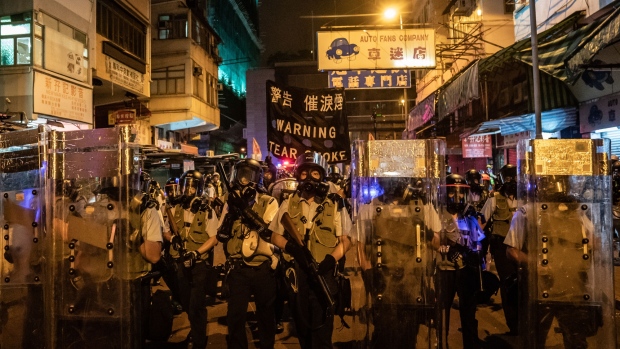Aug 14, 2019
Hong Kong Faces New Threat as Chinese Companies Reconsider IPOs
, Bloomberg News

(Bloomberg) -- Several Chinese companies are rethinking fundraising plans in Hong Kong as anti-government protests rock the city, an ominous sign for its future as a financial gateway between Asia’s largest economy and the rest of the world.
One company scrapped preliminary preparations for a $500 million initial public offering in Hong Kong partly because of the unrest and will instead pursue a U.S. listing, according to a senior banker on the deal, who asked not to be named discussing private information. Another banker said at least two companies are considering the same move for IPOs worth a combined $1 billion, adding that final decisions will depend on market conditions and whether the turmoil in Hong Kong eases.
While the deals amount to a small portion of the money raised by Chinese businesses in Hong Kong in recent years, they bode ill for the city’s status as one of the world’s premier financial hubs. The two senior bankers said Chinese clients are worried about more than just this week’s shutdown of Hong Kong’s airport and other logistical headaches caused by the protests; they’re also questioning whether the city will remain a stable place to do business over the long term.
“The social and political instability has had an impact on people’s perceptions,” said David Cho, a partner at law firm Dechert LLP based in Hong Kong. “The pipeline isn’t looking strong for the remainder of the year, and things could get even worse if China decides to crack down more forcefully in Hong Kong.”
The city’s benchmark Hang Seng Index has tumbled 12% over the past three weeks as clashes between protesters and police turned increasingly violent, raising fears that the Chinese military may intervene to restore order. The S&P 500 Index fell about 5% during the same period.
The stakes could hardly be higher for Hong Kong, whose economy is highly dependent on the financial industry. Chinese companies accounted for $9 billion of the $11 billion raised via IPOs in the former British colony this year, as well as about 80% of bond sales in the city, data compiled by Bloomberg show. Outstanding China-related loans by Hong Kong banks totaled more than $560 billion at the end of the first quarter, according to the Hong Kong Monetary Authority.
The city faces competition from international hubs like the U.S. and Singapore, but it’s also increasingly vying against financial centers in mainland China. A gradual loosening of restrictions on foreign investment has turned Shanghai and Shenzhen into feasible options for Chinese firms who want access to overseas funds.
Even so, few expect China Inc. to abandon Hong Kong’s financial system en masse. U.S. markets are seen as a more stable, but their appeal to Chinese issuers has also diminished somewhat in recent months as the trade war soured relations between the two countries.
One closely watched test of Hong Kong’s appeal is Alibaba Group Holding Ltd.’s proposed mega-listing in the city. The e-commerce giant has filed a listing application for a share sale that may raise as much as $20 billion, people familiar with the matter said in June, but the company has stayed quiet about its intentions since the protests escalated.
Even if the Alibaba deal proceeds as planned, there’s little doubt that Chinese executives have become more wary of Hong Kong. In addition to those rethinking IPOs, several are canceling or postponing meetings with investors in the city to avoid the risk of getting caught up in protest-related violence or travel disruptions, bankers said. Some are using video conferences instead.
Hong Kong’s turmoil has affected the financial industry in other ways. BlackRock Inc., the world’s largest asset manager, postponed its Asia Media Forum in the city to February from September, a company spokeswoman said on Wednesday, so that “as many partners as possible” would be able to join.
While CLSA Ltd. plans to go ahead with its popular annual forum in Hong Kong next month, the investment bank has hired a private security company for the event and is working on contingency plans that include a livestream in case some delegates are unable or unwilling to attend in person.
--With assistance from Tongjian Dong, Annie Lee, Andy Clarke and Alfred Liu.
To contact the reporters on this story: Cathy Chan in Hong Kong at kchan14@bloomberg.net;Manuel Baigorri in Hong Kong at mbaigorri@bloomberg.net
To contact the editors responsible for this story: Sam Mamudi at smamudi@bloomberg.net, Michael Patterson
©2019 Bloomberg L.P.